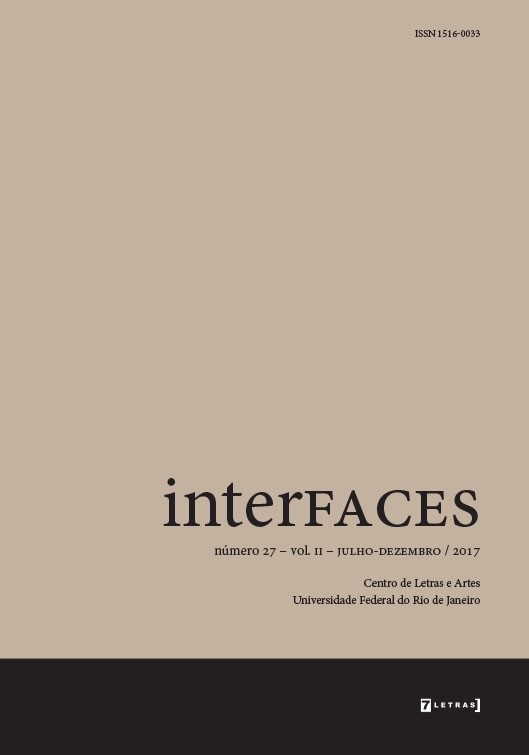Medo de palco: estratégias para o controle
Mots-clés :
Medo de palco, Ansiedade, Performance musicalRésumé
Medo de palco, também conhecido como Ansiedade na Performance Musical, acomete um número significativo de músicos profissionais, cujo desempenho pode ser prejudicado por uma síndrome que envolve a referida situação. O presente trabalho tem por objetivo conscientizar, compreender e sugerir estratégias básicas que possam auxiliar e amenizar os sintomas da ansiedade excessiva antes e/ou durante a performance.Téléchargements
Références
ALVES, Anderson; FREIRE, Ricardo. Aspectos cognitivos no desenvolvimento da expertise musical. In: Performa – International Conference on Performance Studies. Instituto de Artes da UFRGS. 2013. Disponível em: <http://www.academia.edu/3638990/Aspectos_cognitivos_no_desenvolvimento_da_expertise_musical>. Acesso em: 8 ago. 2016.
BÖGELS, Susan; MULKENS, Sandra; JONG, Peter. Task Concentration Report Training and Fear of Blushing. Department of Experimental Abnormal Psychology, Maastricht University, The Netherlands Clinical Psychology and Psychotherapy, v. 4 (4), 1997, p. 251-258. Disponível em: <http://www.praktijkfreekvanbergen.com/support-files/taskconcentrationtrainingandfearofblushing.pdf>. Acesso em: 7 ago. 2016.
BRODSKY, Warren; SLOBODA, John. Clinical trial of a music generated vibrotactible therapeutic environment for musicians: main effects and outcome differences between therapy subgroups. In: RINK, John. La interpretación musical. Cambridge University Press, Alianza Editorial, 2006, p. 199-211.
CLARK, Duncan; AGRAS, Stewart. The assessment and treatment of performance anxiety in musicians. In: RINK, John. La interpretación musical. Cambridge University Press, Alianza Editorial, 2006, p.199-211.
CSIKSZENTMIHALYI, Mihaly. The secret of peak performance: learn how to go with the flow. Men’s Health, Nov. 1996: 58. Disponível em: <http://gogalegroup.ez29.capes.proxy.ufrj.br/ps/i.do?id=GALE%7CA18742199&v=2.1&u=capes&it=r&p=AONE&sw=-w&asid=a0aa114cf93c350b94aad025924f9726>. Acesso em 30 maio 2016.
ERICSSON, Karl; KRAMPE, Ralf; TESCH-RÖMER, Clemens. The role of deliberate practice in the acquisition of expert performance. In: ALVES, Anderson; FREIRE, Ricardo. Aspectos cognitivos no desenvolvimento da expertise musical. Performa – International Conference on Performance Studies. Instituto de Artes da UFRGS. 2013. Disponível em: <http://www.academia.edu/3638990/Aspectos_cognitivos_no_desenvolvimento_da_expertise_musical>. Acesso em: 8 ago. 2016.
HOMMEL, Bernhard; RIDDERINKHOF, Richard; THEEUWES, Jan. Cognitive control of attention and action: Issues and trends. Psychological Research, 66, 2002, p. 215-219.
JACKSON, Jeffrey; LATANÉ, Bibb. All alone in front of all those people: Stage fright as a function of number and type of co-performers and audience. Journal of Personality and Social Psychology, 40 (1), 1981, p. 73-85. Disponível em: <http://psycnet.apa.org/index.cfm?fa=buy.optionToBuy&id=1981-32802-001>. Acesso em: 16 set. 2015.
JONÁS, Alberto. Nervousness in piano playing. In: COOKE, James Frances. Great pianists on piano playing. New York: Dover Publications, 1999, p. 399-418.
OSBORNE, Margaret; GREENE, Don; IMMEL, Don. Managing performance anxiety and improving mental skills in conservatoire students through performance psychology training: a pilot study. Psychology of Well-being: Theory, Research and Practice. 2014. Disponível em: <http://link.springer.com/article/10.1186%2Fs13612-014-0018-3>. Acesso em: 10 set. 2015.
RADUCANU, Andra. Performance anxiety in piano playing. Department of Musicology. University of Arts “G. Enescu”, Iasi – Romênia, 2010. Disponível em: <http://dl.acm.org/citation.cfm?id=1863246>. Acesso em 30 jan. 2016.
SALMON, Paul. A psycological perspective on music performance anxiety: A review of the literature. Medical Problems of Performing Artists, 5, 2-11. In: WILLIAMON, Aaron. Musical Excellence: Strategies and techniques to enhance performance. Londres, Oxford University Press, 2004, p. 199-211.
SAMAROFF, Olga. Concentration in music study. In: COOKE, James. Great Pianists on Piano Playing. New York: Dover Publications, 1999, p. 336-345.
SANTIAGO, Patrícia. Potenciais contribuições da técnica Alexander para a pedagogia pianística. XVI Congresso da Associação Nacional de Pesquisa e Pós-graduação em Música (ANPPOM). Brasília. 2006. Disponível em: <http://www.antigo.anppom.com.br/anais/anaiscongresso_anppom_2006/CDROM/COM/01_Com_EdMus/sessao06/01COM_EdMus_0605-111.pdf>. Acesso em 16 jul. 2016.
STEPTOE, Andrew; FIDLER, Helen. Stage fright in orchestral musicians: A study of cognitive and behavioural strategies in performance anxiety. British Journal of Psychology, 78 (2), 1987, p. 241-249. Disponível em: <http://www.ncbi.nlm.nih.gov/pubmed/3594093>. Acesso em: 2 set. 2015.
VALENTINE, Elizabeth. El miedo escénico. In: RINK, John. La interpretación musical. Cambridge University Press, Alianza Editorial, 2006, p.199-211.
VIETTA, Wilson; PEPER, Erik; SCHMID, Andrea. Training strategies for concentration. In: WILLIAMS, Jean M. Applied Sport Psychology: personal growth to peak performance. 5ª ed. Boston: McGraw Hill, 2006, p. 404-422.
WILLIAMON, Aaron. Musical excellence: strategies and techniques to enhance performance. London: Oxford University Press, 2004.
WOLFE, Véase Mary L. Coping with musical performance anxiety: problem-focused and emotion-focused strategies. In: RINK, John. La interpretación musical. Cambridge University Press/ Alianza Editorial, 2006, p.199-211.
Téléchargements
Publiée
Numéro
Rubrique
Licence

Ce travail est disponible sous la licence Creative Commons Attribution 4.0 International .
O envio dos trabalhos implica a cessão sem ônus dos direitos de publicação, inclusive em versão eletrônica online. Todos os diretos provenientes da venda da revista ficam cedidos à Revista InterFACES. A republicação dos trabalhos deve mencionar a publicação original em Revista InterFACES.

